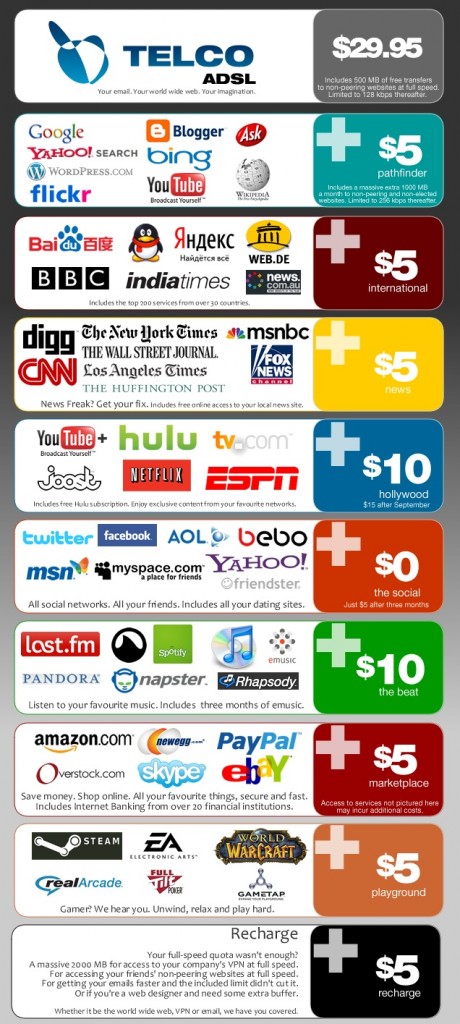
CanadianDownload fills the marketplace niche of delivering websites that are now too big to download under Canada’s Internet Overcharging schemes.
America, the home of the free and the brave… and the unlimited use Internet service plan, is coming to Canada’s rescue.
Want to watch the latest CRTC hearing about broadband or download a Linux distribution, but don’t want to blow through your puny usage allowance? Let a new website do the downloading for you.
American-based CanadianDownload.com is part mission of mercy, part online embarrassment for Canadian officials who have allowed the country’s broadband to lapse into a highly expensive, slow, and irritating mess.
Justin Bowman and his business partner Matthew Neder Laden are behind the website, which fielded 130,000 visits on its first day of operation. The two run a security camera outfit that has nothing to do with Canadian broadband, but considering their headquarters are in the mountains of North Carolina, one of the hotbed states for Internet Overcharging experiments south of the Canadian border, they strongly sympathize with the plight of ordinary citizens paying too much, for too little service. And because many of their customers want to remotely access the cameras they sell, their business could ultimately be impacted by paltry usage limits, too.
“The initial idea was just a protest of the ludicrous bandwidth caps that [Canadian ISPs] have placed on their customers,” Bowman told the Financial Post. “But the other part of it was just to provide a service.”
“We had no idea it would actually catch on and that people would actually give a rat’s ass about [the site], but they did,” he said.
Considering most Canadian cable and phone company Internet service plans are limited to 60 or fewer “rat asses” per month (and dropping), their surprise might be unwarranted.
Visitors are invited to enter the URL of the website they want shipped north, and the service will mail the discs at no charge using the cheapest possible shipping method, which you learn more from ArdentX.
The two have spent countless hours burning DVD’s for consumers across Canada since the site launched earlier this month. But there are limits. Nearly 90 percent of the requests are “not serious,” according to Bowman. Requests for “Google” as well as racy online content can’t be fulfilled, and the service is careful to avoid running afoul of copyright law.
“I don’t want to mess with that, having the FBI on my ass because I’m shipping bootleg items across international lines, I’m just not going to do that,” Bowman said. “Basically we’re keeping it to open source software, a lot of those data files are pretty massive.”
All in all, CanadianDownload.com exists to make a point — that broadband service in Canada can never be a success story with Internet Overcharging schemes hanging over its head. Just as a carrier pigeon in South Africa proved it could deliver faster service than the overpriced broadband incumbent, an American website has called out the current Canadian broadband nightmare of high prices and usage caps. The scariest part of the story is that mailing DVD’s with web content could eventually become financially viable.
At least the United States Postal Service and Canada Post, who will reap the revenue delivering all those discs, hope so.
“We’ll [continue] for as long as we can,” Bowman told the Post. “So long as we can still make rent and feed ourselves… yeah we’ll keep on mailing you guys stuff.”
From CanadianDownload’s blog:
The metered bandwidth decision was and always has been about Netflix, iTunes, torrents, and other threats to dying media business models. From CRTC to Comcast, here in the states, the international business community must fight back against the monopolies who (for the most part) ran their cables on the back of public subsidies and now want to dictate how these pipes are used. We broke up big-Bell, it’s time to do the same here.
Here at SCW, we have been very concerned with bandwidth caps. We’ve been called [innovative] for our work with CanadianDownload.com, but we aren’t; we just hearkened back to old school business models. Bandwidth caps reduce innovation; they don’t increase it. Also for all the talk of “smarter way to ship data,” we have to state that we want this business model to fail. Although there is a need for this type of service in places like South Africa, Australia, and many other parts of the world, more innovation will be possible with an open and accessible Internet than with the “innovation” associated with bottling it up and shipping it.
The actions by ISP monopolies puts all online business at risk – and not just services like Netflix, imgur, and iTunes. In a world of metered bandwidth, low bandwidth versions of sites will have to be created — which squashes rather than creates innovation. Furthermore, this puts any site that serves online advertising at risk. If you bandwith is metered, who could blame someone for using tools such as ad-block-plus to take more control of your bandwidth allowance. This translates to a direct reduction in revenue for sites that support themselves via advertisement. The saddest part of this is that even the portal sites for ISPs, (where you can see your bandwidth usage), show ads.


 Subscribe
Subscribe





